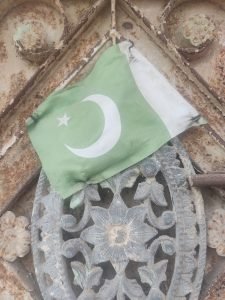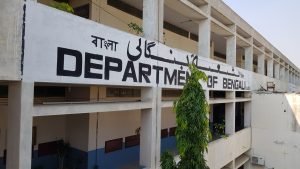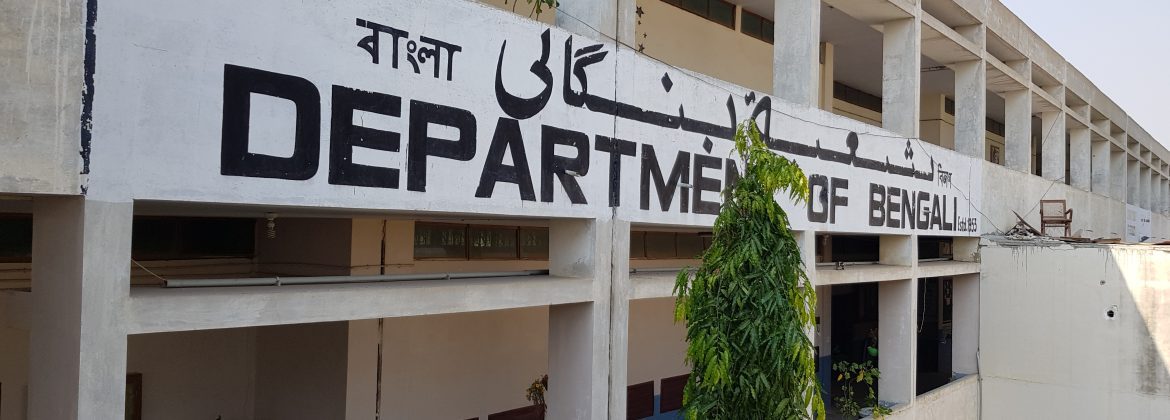By Humera Iqbal, Anushay Malik, Maria Rashid & Arooj Aurangzeb
Our Research Mission

Just over two years ago our team embarked on an ambitious project to trace the modern history and contemporary story of the Pakistani Bengali community living in Pakistan. This is a group that numbers between 2.3-3 million[1], the majority of whom live in Pakistan’s largest urban centre of Karachi. To put this into context, this minority group represents a total nearing the population of Dubai, UAE.
To date there has been some excellent reporting by journalists on this topic (see work by Sahar Balouch, Bilal Karim Mughal, Zia ur Rehman, Mohammed Hanif ). Some academic work exists, in which our contemporaries have explored particular issues faced by the community (e.g. Nausheen Anwar, Haris Gazdar, Naila Mehmood, and Arif Hasan), and recently some important reports have come from third sector organisations documenting key issues linked to citizenship (see here and here). Our study both expands on this work and takes it in new directions by tracing the histories of the Pakistani Bengali community in depth, and gathering intergenerational accounts of members across gender and social backgrounds. Many of the people we spoke to were born in Pakistan.
Our research position is one that is rooted in a concern for social justice and equity. In particular, the concern that nationality and access to citizenship are fundamental human rights. From here we ask the central question: what are the historical, cultural and political factors that prevent access to these rights in relation to Pakistani Bengalis? An important dimension to our research is on everyday life – including family practices and culture, the work people do, where they live and how different generations experience life in Pakistan.
As a social psychologist, a historian and political sociologists, interdisciplinarity has been integral to our research methods and has allowed us to collect 85 intergenerational oral history interviews, with Pakistani Bengalis (the majority of whom are from different localities in Karachi), detailed archival work (from national and international archives), media analysis, as well as community workshops, participatory research and arts based work. Our project partners and wider team have been intrinsic to this process. What is clear to us is that this is a complex story, and that events of the past (predating and especially from 1971) affect the everyday life of Pakistani Bengalis, including younger members who were born in Pakistan.
Historical Context and What our Early Findings show
Prior to the liberation war of 1971 that resulted in the formation of Bangladesh (formally East Pakistan), Bengali speakers living in East Pakistan could travel, live and work in both sides of the country. After 1971, some fled the effects of war while others came to West Pakistan for economic reasons and sometimes to reunite with families. Therefore the migration of Bengali speakers to Pakistan continued. In other words, geographically while one country may have become two, psychologically for many people the former West Pakistan continued to be a place deep rooted in family stories and remembered by elders.
Labelled by some as the “second Partition of the subcontinent” the turning point of 1971 is remembered very differently by different social groups across South Asia. States and political parties have fought to rewrite history using textbooks and media in an attempt to shape the collective historical memory of these events. For Pakistan much effort has gone into forgetting details of this past and remembering it, almost entirely, as a war with India erasing the fact that Bangladesh, and thereby all people who lived there, regardless of language and religion, had been Pakistani citizens. This selective historical amnesia has allowed the Pakistani State to firmly situate people with any link to East Pakistan as outsiders. Those amongst the Pakistani Bengali population, many of whom live in the city of Karachi, and who were born here, continue to feel the brunt of this.
Our early findings show how systematic discrimination, rooted in a longer history has been compounded at key historical junctures, one of which was the year 2000 when former manual paper ID cards (introduced in 1973) were replaced with biometric digital CNICs (computerized identity cards). The most common proof of citizenship in Pakistan are these CNICs (computerized national identity cards) and this proof is needed for everything from having a bank account, obtaining educational qualifications, buying a phone SIM card, getting a job to even registering your death. With the establishment of the National Database Registration Authority and the National Alien Registration Authority in 2000 citizenship challenges faced by the Pakistani Bengalis compounded.
The merger of both these organizations in 2015 had severe consequences for the Pakistani Bengali community[2]. For instance, some of the people interviewed for this project described how they were rounded up and forced to sign alien registration cards. Often, they did not know what they were agreeing to. Since citizenship record keeping is genealogy based in Pakistan[3], many members of their family who may have had citizenship, now would have their citizenship status blocked or revoked, rendering them stateless. This has extended across generations, resulting in intergenerational statelessness[4].
Our interviews reveal multiple in-depth accounts of how events in the past impact families today, and most importantly how obtaining and renewing CNICs can be a challenging process for Pakistani Bengalis with the issue of card blocking and stigma faced in CNIC offices being immense[5]. How state officials identify and surveil Pakistani Bengalis– based on cultural attributes like appearance and accent, place of residence is telling of wider social prejudice. This is crucially important, because to deny that Bengali speakers can also be Pakistani is yet again an erasure of the fact that Bangladesh and Pakistan were once one country. This erasure continues in the census which, in 2017 and even in the most recent 2023 version (yet to be published) did not include “Bengali” as an option for mother tongue (despite languages such as Punjabi, Saraiki and Kashmiri being recognized).
Having your citizenship taken away, is something which is significantly more challenging for the poor and precarious. It is a struggle that a segment of the Pakistani Bengali population, particularly in Karachi, clearly still has to deal with in their everyday lives.

————–
*We are currently writing up our findings from our project for publication and have a series of other outputs which will be coming out over the next few months. Please keep an eye on our website for more details.
Footnotes:
[1] Note that no exact figures exist. These numbers are based on estimates. See Universal Periodic Review, PAKISTAN, 42nd Session, Fourth cycle. 2023. Imkaan Welfare Organisation. Nationality for All. Institute for Statelessness and Inclusion.
[2] Nausheen Anwar is one of the few academics to have written on this hidden issue. See here
[3] See here for work by Zehra Hashmi (2022) for more details on the digital and genealogical computation of citizens in Pakistan
[4] To clarify, by statelessness, we mean ‘a person who is not considered as a national by any State under the operation of its law’ (from Article 1(1) of the 1954 Convention Relating to the Status of Stateless Persons). The exact global figures on Stateless people are unknown but the UNHCR estimates there are many millions globally.
[5] Writing from our project will document this in further depth

